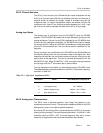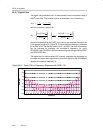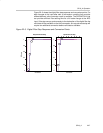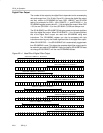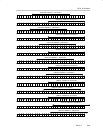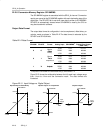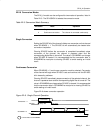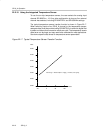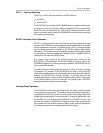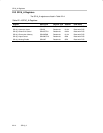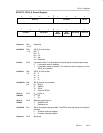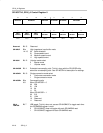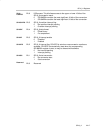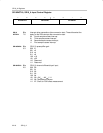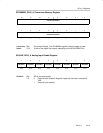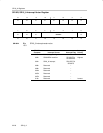
SD16_A Operation
22-13SD16_A
22.2.11 Interrupt Handling
The SD16_A has 2 interrupt sources for its ADC channel:
- SD16IFG
- SD16OVIFG
The SD16IFG bit is set when the SD16MEM0 memory register is written with
a conversion result. An interrupt request is generated if the corresponding
SD16IE bit and the GIE bit are set. The SD16_A overflow condition occurs
when a conversion result is written to SD16MEM0 location before the previous
conversion result was read.
SD16IV, Interrupt Vector Generator
All SD16_A interrupt sources are prioritized and combined to source a single
interrupt vector. SD16IV is used to determine which enabled SD16_A interrupt
source requested an interrupt. The highest priority SD16_A interrupt request
that is enabled generates a number in the SD16IV register (see register
description). This number can be evaluated or added to the program counter
to automatically enter the appropriate software routine. Disabled SD16_A
interrupts do not affect the SD16IV value.
Any access, read or write, of the SD16IV register has no effect on the
SD16OVIFG or SD16IFG flags. The SD16IFG flags are reset by reading the
SD16MEM0 register or by clearing the flags in software. SD16OVIFG bits can
only be reset with software.
If another interrupt is pending after servicing of an interrupt, another interrupt
is generated. For example, if the SD16OVIFG and one or more SD16IFG
interrupts are pending when the interrupt service routine accesses the SD16IV
register, the SD16OVIFG interrupt condition is serviced first and the
corresponding flag(s) must be cleared in software. After the RETI instruction
of the interrupt service routine is executed, the highest priority SD16IFG
pending generates another interrupt request.
Interrupt Delay Operation
The SD16INTDLYx bits control the timing for the first interrupt service request
for the corresponding channel. This feature delays the interrupt request for a
completed conversion by up to four conversion cycles allowing the digital filter
to settle prior to generating an interrupt request. The delay is applied each time
the SD16SC bit is set or when the SD16GAINx or SD16INCHx bits for the
channel are modified. SD16INTDLYx disables overflow interrupt generation
for the channel for the selected number of delay cycles. Interrupt requests for
the delayed conversions are not generated during the delay.



